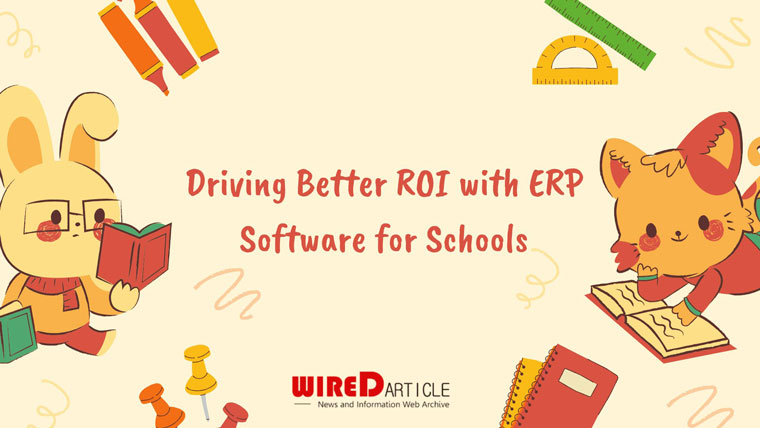- Publish on 2024-07-06 18:35:54
-

Awadhesh
- Basic
- 7 Articles
Implementing Enterprise Resource Planning (ERP) software in schools can significantly improve efficiency, streamline operations, and enhance overall educational experiences. School ERP solutions are comprehensive software systems designed to manage and integrate all the key functions of an educational institution. By automating and streamlining various administrative and academic processes, these solutions can drive positive ROI (Return on Investment) for schools.

Implementing a School ERP system can drive positive ROI for your school by enhancing operational efficiency, reducing costs, and improving the overall educational experience. By automating administrative tasks, enabling data-driven decision-making, and ensuring secure and scalable operations, ERP systems help schools achieve their financial and educational goals. The long-term benefits of increased productivity, cost savings, and improved student outcomes make investing in a School ERP solution a strategic move that yields substantial returns.
- Automate Administrative Tasks: ERP software automates routine administrative tasks such as admissions, attendance tracking, fee management, and report generation, ERP systems reduce the need for extensive administrative staff, leading to significant employee cost savings.
- Enhance Resource Management: Automated inventory management for supplies, books, and equipment helps avoid overstocking and understocking, reducing waste and ensuring cost-effective use of resources. Track and manage inventory of supplies, textbooks, and equipment, ensuring optimal stock levels and reducing wastage.
- Improved Communication and Collaboration: ERP software centralizes information, making it accessible to all stakeholders, including administrators, teachers, students, and parents. Portals and mobile apps facilitate better communication between parents and teachers, improving parental engagement and satisfaction, which can lead to better student outcomes.
- Data-Driven Decision Making: Track key performance indicators (KPIs) such as student enrollment, academic performance, and financial health to identify areas for improvement and measure the impact of initiatives. Detailed financial reports help in tracking expenses, optimizing budgets, and identifying areas for cost savings.
- Enhance Student Experience: Improve student services such as library management, hostel management, and transport management, enhancing the overall student experience. ERP systems provide real-time insights into resource utilization, helping schools allocate resources such as classrooms, teaching materials, and staff more efficiently.
- Increased Operational Efficiency: Simplify compliance with educational regulations and reporting requirements through automated processes and accurate record-keeping. By integrating various functions such as admissions, finance, academics, and HR into a single platform, ERP solutions eliminate redundant processes and ensure seamless workflows.
- Financial Management: Automated fee collection and reminders improve cash flow and reduce delays in payment processing.
School ERP solutions drive positive ROI by enhancing operational efficiency, reducing costs, improving resource management, and providing better educational experiences. Investing in a robust ERP solution is a strategic move that can yield significant long-term benefits for any educational institution.
ERP systems significantly boost ROI in educational institutions by enhancing operational efficiency, reducing costs, and improving the overall educational experience. By automating administrative tasks, enabling data-driven decision-making, and ensuring secure and scalable operations, ERP systems help schools and universities achieve their financial and educational goals. The long-term benefits of increased productivity, cost savings, and improved student outcomes make investing in an ERP solution a strategic move that yields substantial returns.
